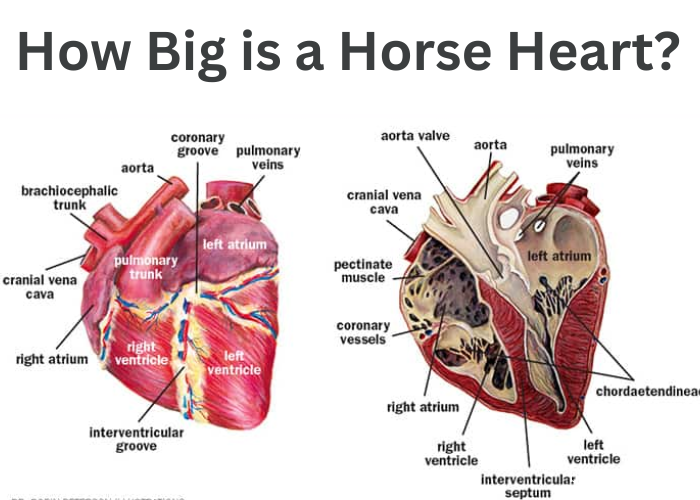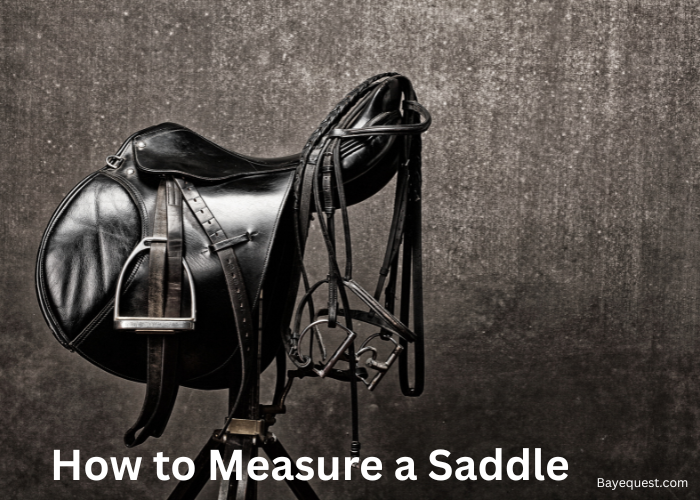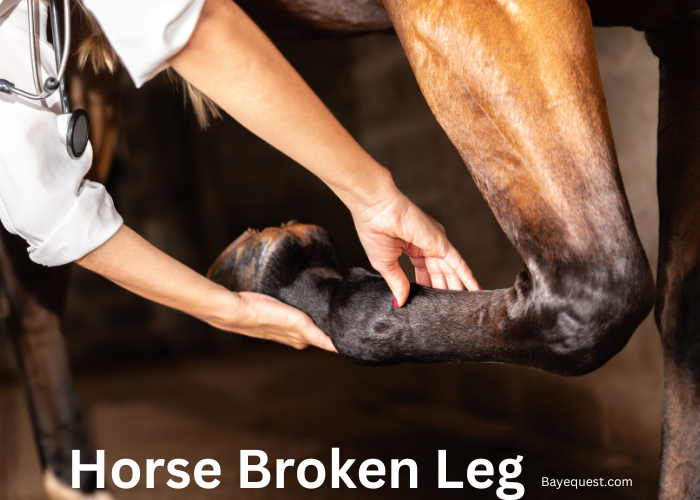A horse’s heart is impressive. It’s not just powerful; it’s huge. In fact, it can weigh more than a newborn baby.
The heart gives horses the strength to race, pull, and endure long distances. Its size plays a major role in their incredible stamina.
Whether running on a track or working on a farm, a horse’s heart works hard to keep up.
But just how big is it?
Let’s dive in and explore what makes this amazing organ so special.
How Big is a Horse Heart? Key Takeaway
A horse’s heart weighs between 8 and 11 pounds, much larger than a human heart, and makes up about 0.5% to 1% of its total body weight. In some racehorses, like Secretariat, the heart can be even bigger, reaching up to 22 pounds.
What Does a Horse Heart Look Like?
The horse’s heart is a large, powerful muscle that pumps blood throughout the body. It’s located in the chest, between the lungs, and sits just above the front legs.
Structurally, it’s made up of four chambers – two atria and two ventricles. The atria receive blood, while the ventricles pump it out.
The right side of the heart sends blood to the lungs to pick up oxygen. The left side pumps oxygen-rich blood to the rest of the body.
The walls of the heart are thick, especially in the ventricles, because they need the strength to push blood around such a big animal.
Valves inside the heart control the flow, making sure the blood moves in one direction, preventing any backflow.
A horse’s heart is designed for endurance, pumping huge volumes of blood to support long periods of physical activity.
Horse Heart Size
A horse’s heart is impressively large. It weighs between 8 and 11 pounds, much heavier than the human heart.
Some horses, especially racehorses, can have even bigger hearts. Secretariat, the legendary racehorse, had a heart estimated to weigh around 22 pounds.
The size of a horse’s heart can vary based on its breed and fitness level, but larger hearts mean more blood is pumped with each beat.
This is key to their stamina, allowing horses to run fast and work hard for long periods. It’s a true powerhouse, driving their remarkable endurance and performance.
Why Do Horses Have Big Hearts?
Horses have big hearts because they need to supply their large bodies with oxygen.
A bigger heart pumps more blood with each beat, delivering oxygen to the muscles faster.
This supports endurance and allows horses to maintain speed for long periods. The heart’s size increases blood flow, which improves oxygen transport to tissues.
This is crucial for physical activities like running, which requires sustained energy. In racehorses, a larger heart helps them reach peak performance by ensuring efficient circulation.
The heart’s size directly impacts their ability to handle intense exercise and recover quickly.
Heart Rate and Blood Volume
Heart Rate refers to how many times the heart beats per minute.
In horses, the resting heart rate is between 28 and 44 beats per minute. During intense activity, like racing, it can rise to 240 beats per minute.
The heart rate increases to pump more blood, delivering oxygen and nutrients to the muscles faster when the horse is active.
Blood Volume is the total amount of blood circulating in the horse’s body.
Horses have a large blood volume, about 8-10% of their body weight. This means a 1,000-pound horse has roughly 80-100 liters of blood.
The higher blood volume helps transport oxygen more efficiently, supporting the horse’s stamina and endurance during exercise.
How to Measure Horse Heart Rates
Measuring a horse’s heart rate is simple with the right tools. Here’s how:
1. Using a stethoscope
- Place the stethoscope on the horse’s left side, just behind the elbow.
- Listen for the heartbeat and count the beats for 15 seconds.
- Multiply this number by 4 to get the heart rate in beats per minute (bpm).
2. Using a heart rate monitor
- Attach the monitor’s electrodes to the horse’s girth area, where the heart is located.
- The monitor will display the heart rate in real-time, providing accurate bpm readings during rest or exercise.
3. Feeling the pulse
- Find the pulse under the jaw or at the back of the fetlock.
- Count the pulse beats for 15 seconds, then multiply by 4 to calculate bpm.
- Make sure the horse is calm and resting if you’re measuring a resting heart rate. For exercise heart rates, measure right after activity for the most accurate reading.
Horse Heart Abnormalities
Horse heart abnormalities can affect their performance and overall health. Some common heart conditions include:
Arrhythmia. This is an irregular heartbeat. It can be too fast, too slow, or irregular in rhythm. Some arrhythmias are normal after exercise, but persistent ones can signal underlying issues.
Heart murmurs. A heart murmur is an unusual sound heard during a heartbeat. It’s caused by turbulent blood flow and can indicate problems like valve defects or congenital issues. Some murmurs are harmless, while others require medical attention.
Atrial fibrillation. This is when the heart’s upper chambers (atria) beat irregularly and out of sync with the lower chambers. It can cause poor blood flow and decreased performance, especially in racehorses.
Congestive heart failure. This occurs when the heart cannot pump blood efficiently, leading to fluid buildup in the lungs or body. It’s a serious condition that requires veterinary care.
Endocarditis. Inflammation of the heart’s inner lining, usually caused by infection. It can lead to valve damage and requires aggressive treatment.
Facts About the Equine Heart
1. The average horse heart weighs between 8 and 11 pounds, with some racehorses like Secretariat having hearts as large as 22 pounds.
2. A horse’s resting heart rate is between 28 and 44 beats per minute. During exercise, it can increase to over 200 bpm.
3. Horses have a large blood volume, around 8-10% of their body weight, helping deliver oxygen efficiently during exercise.
4. A horse’s heart pumps about 7 to 10 gallons of blood per minute at rest, increasing significantly during strenuous activity.
5. The heart’s large size and efficiency help horses maintain stamina over long distances, crucial for both work and athletic performance.
6. At peak exercise, a horse’s heart can pump up to 65 liters of blood per minute, which supports their intense physical activities.
7. Like all mammals, a horse’s heart has four chambers: two atria and two ventricles, which work together to keep the blood flowing.
8. The heart makes up about 0.5% to 1% of the horse’s total body weight, a larger percentage than in most other mammals.
9. Horses can have heart murmurs, which are abnormal sounds during a heartbeat. Some murmurs are harmless, but others need monitoring.
10. A fit horse will have a lower resting heart rate and faster recovery time after exercise, indicating a strong and healthy heart.
Horse With “Heart” Meaning
When people say a horse has “heart,” they’re referring to its determination, courage, and willingness to keep going, even when things get tough.
It’s a way to describe a horse’s spirit and resilience, not just its physical strength.
A horse with “heart” will push through fatigue, stay focused, and give everything it has, especially in demanding situations like racing or long-distance events.
This term is often used to highlight a horse’s inner drive and ability to perform beyond expectations.
FAQs
How big is a horse brain?
A horse’s brain weighs about 1.5 to 2 pounds, which is smaller compared to its body size. It’s roughly the size of a grapefruit. Despite its size, horses are intelligent and have strong memory capabilities.
How big are horse lungs?
Horse lungs are large and powerful, with a total lung capacity of about 55 liters. During intense exercise, a horse can breathe in and out nearly 10 gallons of air per minute. Read more on horse lungs in our guide “horse lung size”
How Big is a Horse’s Heart? Conclusion
A horse’s heart is truly an amazing organ. It’s big, powerful, and designed for endurance. Weighing between 8 and 11 pounds, it helps horses run fast and work hard over long distances.
Some horses, like Secretariat, even had hearts as large as 22 pounds. This large heart pumps more blood, giving horses the stamina they need.
Whether they’re racing or working, the heart is at the core of their strength and performance.
Next time you see a horse, remember the powerhouse pumping inside, keeping them going strong.








